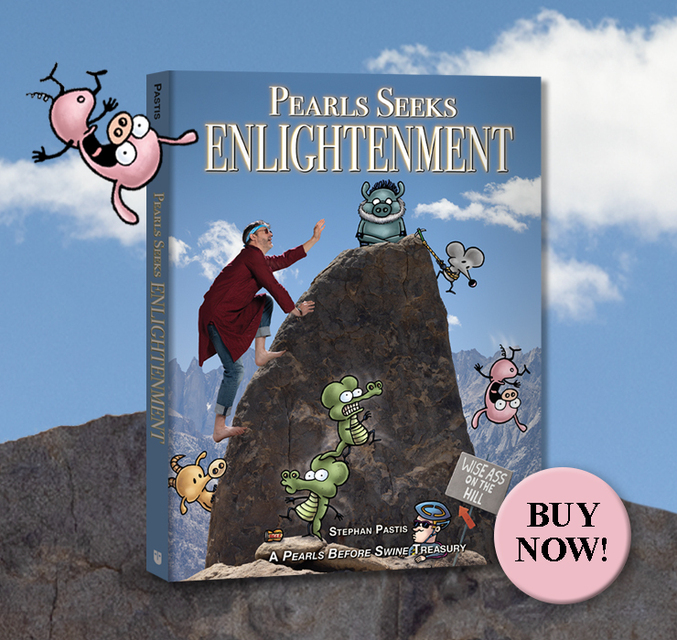Pearls Before Swine by Stephan Pastis for December 09, 2008
Transcript:
Pig says, "Rat said you were worried about nuclear bombs." Zebra says, "Not anymore, Pig. I did some research and now realize that some group having the bomb is irrelevant if they don't have a delivery system." What's that mean?" Zebra says, "They have to have a way to fire it at you...It's not like they can just deliver it to your front door." Zebra crocodile says, "Reeng doorbell." crocodile says, "You reeng doorbell."












legoguy77 about 12 years ago
(collapses on floor and proceeds to spasm with laughter)
Pearlslover01 about 12 years ago
I thought the crocs wanted to eat Zebra, not blow him up.
zianrocks2468 almost 12 years ago
If I was Zebra, those crocs wouldn’t last a day.
doctorwhomedia almost 12 years ago
Why are they using a nuclear missile? They’ll all die, and they won’t be able to eat Zebra. (Yes, I know I’m overthinking this.)
ShpelChekz over 8 years ago
“A-bomb” redirects here. For other uses, see A-bomb (disambiguation).
The mushroom cloud of the atomic bombing of the Japanese city of Nagasaki on August 9, 1945 rose some 11 miles (18 km) above the bomb’s hypocenter.Nuclear weaponsReplica of the “Fat Man” nuclear bomb dropped on Nagasaki, Japan, on August 9, 1945BackgroundHistory Warfare Workers Arms race Design Testing Ethics Effects Delivery Espionage Proliferation Arsenals Terrorism OppositionNuclear-armed statesNPT recognizedUnited States Russia United Kingdom France ChinaOthersIndia Israel (undeclared) Pakistan North Koreav t eWeapons of mass destructionWMD world map.svgBy typeBiological Chemical Nuclear RadiologicalBy countryAlbania Algeria Argentina Australia Brazil Bulgaria Canada China Egypt France Germany India Iran Iraq Israel Japan Libya Mexico Myanmar Netherlands North Korea Pakistan Philippines Poland Romania Russia Saudi Arabia South Africa South Korea Spain Sweden Switzerland Syria Taiwan Ukraine United Kingdom United StatesProliferationChemical Nuclear MissilesTreatiesList of treatiesWikipedia book Book Category Categoryv t eA nuclear weapon is an explosive device that derives its destructive force from nuclear reactions, either fission (fission bomb) or a combination of fission and fusion (thermonuclear weapon). Both reactions release vast quantities of energy from relatively small amounts of matter. The first test of a fission (“atomic”) bomb released the same amount of energy as approximately 20,000 tons of TNT (84 TJ). The first thermonuclear (“hydrogen”) bomb test released the same amount of energy as approximately 10 million tons of TNT (42 PJ).1
A thermonuclear weapon weighing little more than 2,400 pounds (1,100 kg) can produce an explosive force comparable to the detonation of more than 1.2 million tons of TNT (5.0 PJ).2 A nuclear device no larger than traditional bombs can devastate an entire city by blast, fire, and radiation. Nuclear weapons are considered weapons of mass destruction, and their use and control have been a major focus of international relations policy since their debut.
Nuclear weapons have been used twice in nuclear warfare, both times by the United States against Japan near the end of World War II. On August 6, 1945, the U.S. Army Air Forces detonated a uranium gun-type fission bomb nicknamed “Little Boy” over the Japanese city of Hiroshima; three days later, on August 9, the U.S. Army Air Forces detonated a plutonium implosion-type fission bomb codenamed “Fat Man” over the Japanese city of Nagasaki. The bombings resulted in the deaths of approximately 200,000 civilians and military personnel from acute injuries sustained from the explosions.3 The ethics of the bombings and their role in Japan’s surrender remain the subject of scholarly and popular debate.
Since the atomic bombings of Hiroshima and Nagasaki, nuclear weapons have been detonated on over two thousand occasions for the purposes of testing and demonstration. Only a few nations possess such weapons or are suspected of seeking them. The only countries known to have detonated nuclear weapons—and acknowledge possessing them—are (chronologically by date of first test) the United States, the Soviet Union (succeeded as a nuclear power by Russia), the United Kingdom, France, the People’s Republic of China, India, Pakistan, and North Korea. Israel is also believed to possess nuclear weapons, though in a policy of deliberate ambiguity, it does not acknowledge having them. Germany, Italy, Turkey, Belgium and the Netherlands are nuclear weapons sharing states.456
The nuclear non-proliferation treaty aimed to reduce the spread of nuclear weapons, but its effectiveness has been questioned, and political tensions remained high in the 1970s and 1980s. As of 2016, 16,000 nuclear weapons are stored at sites in 14 countries and many are ready for immediate use. Modernisation of weapons continues to occur.7_________________________________________________
Some big long boring report on Nuclear Weaponz.